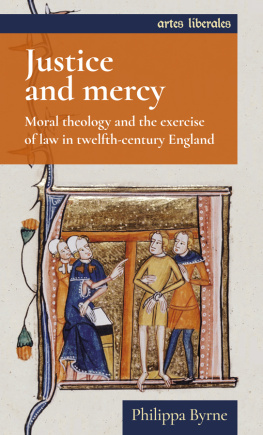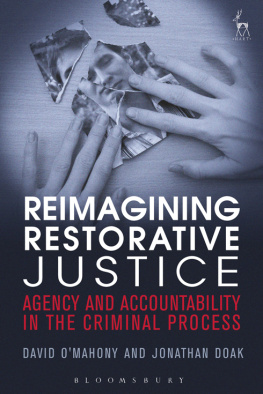Mercy
A Restorative Philosophy
David J Cornwell
With a Foreword by Tapio Lappi-Seppl
Copyright and publication details
Mercy: A Restorative Philosophy
David J Cornwell
ISBN 978-1-909976-01-6 (Paperback)
ISBN 978-1-908162-77-9 (Epub ebook)
ISBN 978-1-908162-78-6 (Adobe ebook)
Copyright 2014 This work is the copyright of David J Cornwell. All intellectual property and associated rights are hereby asserted and reserved by him in full compliance with UK, European and international law. No part of this book may be copied, reproduced, stored in any retrieval system or transmitted in any form or by any means, including in hard copy or via the internet, without the prior written permission of the publishers to whom all such rights have been assigned worldwide.
Cover design 2014 Waterside Press. Design by www.gibgob.com .
Main UK distributor Gardners Books, 1 Whittle Drive, Eastbourne, East Sussex, BN23 6QH . Tel: +44 (0)1323 521777; ; www.gardners.com
North American distribution Ingram Book Company, One Ingram Blvd, La Vergne, TN 37086, USA. Tel: (+1) 615 793 5000;
Cataloguing-In-Publication Data A catalogue record for this book can be obtained from the British Library.
Printed by Lightning Source.
e-bookMercy is available as an ebook and also to subscribers of Myilibrary, Dawsonera, ebrary, and Ebscohost.
Published 2014 by
Waterside Press
Sherfield Gables
Sherfield-on-Loddon
Hook, Hampshire
United Kingdom RG27 0JG
Telephone +44(0)1256 882250
E-mail
Online catalogue WatersidePress.co.uk
Contents
Dedication
This book is most respectfully dedicated to the Memory of
NELSON ROLIHLAHLA MANDELA
18 July 1918 to 5 December 2013
Lawyer, Human Rights Activist, Prisoner, Statesman,
Nobel Peace Laureate, First Democratically-elected President
of the Republic of South Africa 1994 to 1999.
An exemplar of courage, dignity, humility and forgiveness.
Loved by his nation: Mourned by the civilised world.
Acknowledgements
My grateful thanks are extended to all of those who have provided encouragement and support in the completion of this book, and in particular to my friend and colleague Professor John Blad of Erasmus University, Rotterdam, The Netherlands, who has insisted from its inception that it should be pursued to a conclusion.
I am also indebted, as ever, to Bryan Gibson and the staff at Waterside Press who have transformed the manuscript into its finished and indexed state with all their customary skill and attention to detail.
And finally, my sincere thanks to Dr Tapio Lappi-Seppl, Director General of the National Research Institute of Legal Policy in Helsinki, Finland, for making the time within a very demanding work schedule to provide the Foreword to this work which is greatly appreciated and so clearly expressed.
David J Cornwell
Conderton
Gloucestershire
United Kingdom
May 2014
About the Author
Dr David J Cornwell is a consultant criminologist, former prison governor and tutor at HM Prison Service College, Wakefield. He has wide experience as a practitioner of custodial corrections in the public and private sectors in the UK and at Bloemfontein in the Republic of South Africa. He is the author of a trilogy of books on restorative justice: Criminal Punishment and Restorative Justice (2006), Doing Justice Better (2007) and The Penal Crisis and the Clapham Omnibus (2009), also of numerous journal articles and conference papers. With John Blad and Martin Wright he is the editor of Civilising Criminal Justice (2013). David Cornwell has undertaken consultancy assignments under the auspices of the Council of Europe in Poland (Themis Plan) and visited prisons in a number of European countries.
The author of the Foreword
Dr Tapio Lappi-Seppl is the Director General of the National Research Institute of Legal Policy in Helsinki, Finland.
Foreword
Tapio Lappi-Seppl
This book is about doing criminal justice in a more humane and purposeful manner. It is a book that offers a new principled justification for restorative justice by linking it with another widely acknowledged concept and practice that is of mercy.
The book challenges traditional deterrent and retributive penal philosophies, as well as the social and legal practices that have been conducted from these starting points. It grew, in the authors own words, from professional dissatisfaction with explanations of punishment and criminal justice theory and practice, and by acute awareness that in Britain in particular over the past decades criminal justice has become increasingly merciless towards offenders, while at the same time almost studiously avoiding affording victims of crime the status and empowerment that they evidently deserve. These practices include over-reliance upon imprisonment; a phenomenon in Europe most visible in Britain. They include also the expansion of new and intrusive forms social control carried on outside traditional criminal justice, such as the widely used anti-social behaviour orders (ASBOs) in the UK.
Restorative justice, as formulated in the first writings in the late-1970s, was offered as an alternative to official criminal justice. This it never really became. Victims rights did penetrate into high profile political speeches and even programmes, but far too often in the form of increased penalties and as a part of populist penal policy, not as truly reparative or restorative practices. This is one of the failures of restorative justice that David Cornwells book seeks to correct.
Despite its short format, the book follows a highly ambitious programme. This is basically a book about the justification, aims and effects of criminal punishment. But it is also a philosophical treatise about the rarely discussed concept of mercy; a book about victims rights; and a reform programme for the reorganizing of the criminal justice process. A reasoned discussion of all this calls for knowledge and understanding not only on the philosophy of punishment, but of criminological theories, existing social practices, and of empirical evidence on the effects of crime control. David Cornwell is able to bring all this to the table in an exciting and fresh manner.
Books and presentations on restorative justice are known for being filled with empathy and good intentions. This one incorporates also strict analyses and empirical evidence. The authors innovative idea of linking restorative justice with mercy raises the discussion of the justification of restorative justice to a more fundamental and principled level. The practical aim formulating a criminal justice system that is less damaging, more purposeful, more humane, and does better justice for all parties cannot be contested. And as such, this is a book for everyone concerned about the unfortunate state of our existing penal practices.









